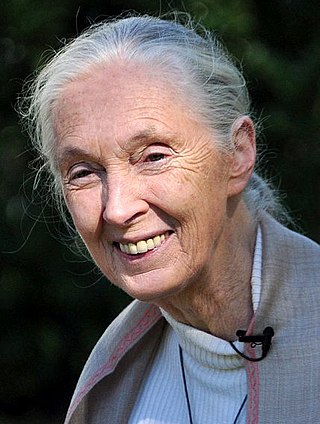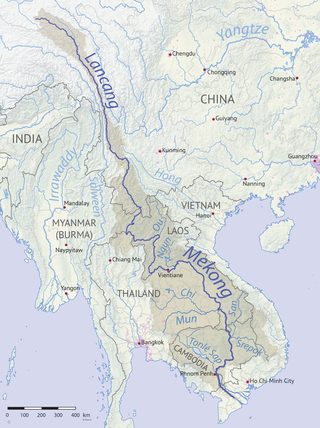Related Research Articles

Dame Jane Morris Goodall, formerly Baroness Jane van Lawick-Goodall, is an English zoologist, primatologist and anthropologist. She is considered the world's foremost expert on chimpanzees, after 60 years' studying the social and family interactions of wild chimpanzees. Goodall first went to Gombe Stream National Park in Tanzania to observe its chimpanzees in 1960.

The water industry provides drinking water and wastewater services to residential, commercial, and industrial sectors of the economy. Typically public utilities operate water supply networks. The water industry does not include manufacturers and suppliers of bottled water, which is part of the beverage production and belongs to the food sector.

The United Nations Environment Programme (UNEP) established Champions of the Earth in 2005 as an annual awards programme to recognize outstanding environmental leaders from the public and private sectors and from civil society.

The Jane Goodall Institute (JGI) is a global non-profit wildlife and environment conservation organization headquartered in Washington, DC. It was founded in 1977 by English primatologist Jane Goodall and Genevieve di San Faustino (1919-2011). The institute's mission is to improve the treatment and understanding of primates through public education and legal representation, to protect their habitats in partnership with local communities, and to recruit and train young people for these missions.
The Jane Goodall Institute (Hong Kong) (Chinese: 國際珍古德(香港)協會), founded in 2002, was established as a local registered charity involved in the promotion of the well-being of the community, animals and environment. The Jane Goodall Institute Hong Kong is one of the Asian branches of the Jane Goodall Institute which was founded in 1977 in California by Jane Goodall and Genevieve, Princess di San Faustino. With its headquarters in the US, the Jane Goodall Institute is a worldwide non-profit organization with 17 overseas offices.
Water supply and sanitation in Indonesia is characterized by poor levels of access and service quality. More than 16 million people lack access to an at least basic water source and almost 33 million of the country's 275 million population has no access to at least basic sanitation. Only about 2% of people have access to sewerage in urban areas; this is one of the lowest in the world among middle-income countries. Water pollution is widespread on Bali and Java. Women in Jakarta report spending US$11 per month on boiling water, implying a significant burden for the poor.
In 2020, 97.7% of Indians had access to the basic water and sanitation facilities. India faces challenges ranging from sourcing water for its megacities to its distribution network which is intermittent in rural areas with continuous distribution networks just beginning to emerge. Non-revenue water is a challenge.

Access to water supply and sanitation in Ethiopia is amongst the lowest in Sub-Saharan Africa and the entire world. While access has increased substantially with funding from foreign aid, much still remains to be done. Some factors inhibiting the achievement of these goals are the limited capacity of water bureaus in the country's nine regions, two city administrations and water desks in the 770 districts of Ethiopia (woredas); insufficient cost recovery for proper operation and maintenance; and different policies and procedures used by various donors, notwithstanding the Paris Declaration on Aid Effectiveness.

Water supply and sanitation in China is undergoing a massive transition while facing numerous challenges such as rapid urbanization, increasing economic inequality, and the supply of water to rural areas. Water scarcity and pollution also impact access to water.

Although access to water supply and sanitation in sub-Saharan Africa has been steadily improving over the last two decades, the region still lags behind all other developing regions. Access to improved water supply had increased from 49% in 1990 to 68% in 2015, while access to improved sanitation had only risen from 28% to 31% in that same period. Sub-Saharan Africa did not meet the Millennium Development Goals of halving the share of the population without access to safe drinking water and sanitation between 1990 and 2015. There still exists large disparities among sub-Saharan African countries, and between the urban and rural areas.

WASH is a sector focused on providing water, sanitation, and hygiene services. It aims to achieve public health gains, uphold the human right to water and sanitation, reduce the burden of collecting drinking water, and improve health and education outcomes. Access to WASH services is critical for sustainable development and is integral to achieving Sustainable Development Goal 6, which targets equitable access to water and sanitation for all. Despite progress, billions still lack basic sanitation and clean drinking water, making WASH a vital focus for international development.

Water issues in developing countries include scarcity of drinking water, poor infrastructure for water and sanitation access, water pollution, and low levels of water security. Over one billion people in developing countries have inadequate access to clean water. The main barriers to addressing water problems in developing nations include poverty, costs of infrastructure, and poor governance. The effects of climate change on the water cycle can make these problems worse.

Under the Dome is a 2015 self-financed Chinese documentary by Chai Jing, a former China Central Television journalist, and Ming Fan, the documentary director, her long-term working partner at CCTV, concerning air pollution in China. It was viewed over 150 million times on Tencent within three days of its release and had been viewed a further 150 million times by the time it was taken offline four days later.

Swachh Bharat Mission (SBM), Swachh Bharat Abhiyan, or Clean India Mission is a country-wide campaign initiated by the Government of India on 2 October 2014 to eliminate open defecation and improve solid waste management and to create Open Defecation Free (ODF) villages. The program also aims to increase awareness of menstrual health management. It is a restructured version of the Nirmal Bharat Abhiyan which was launched by the Congress in 2009.
Water supply and sanitation in Zimbabwe is defined by many small scale successful programs but also by a general lack of improved water and sanitation systems for the majority of Zimbabwe. Water supply and sanitation in Zimbabwe faces significant challenges, marked by both successful localized efforts and widespread deficiencies in infrastructure. According to the 2019 Multiple Indicator Cluster Surveys (MICS), conducted by UNICEF, disparities persist in access to clean drinking water and sanitation facilities. While overall access to improved drinking water sources increased to 77.1% in 2019 from 76.1% in 2014, significant gaps remain between urban and rural areas, as well as within urban centers. For instance, 97.3% of urban households have access to improved water sources compared to only 67.9% of rural households. Similarly, disparities exist across regions, with Harare boasting the highest access at 96.6%, contrasting sharply with 64.8% in Matabeleland South. Additionally, approximately 67.8% of households have access to improved, non-shared sanitation facilities, indicating ongoing challenges in this domain. Urban areas, in particular, grapple with chronic water shortages amid rising consumption demands. There are many factors which continue to determine the nature, for the foreseeable future, of water supply and sanitation in Zimbabwe. Three major factors are the severely depressed state of the Zimbabwean economy, the willingness of foreign aid organizations to build and finance infrastructure projects, and the political stability of the Zimbabwean state.

Betsy Damon is an American ecofeminist artist whose work has been influenced by her activism in women's, gay, and environmental rights.

Laos is a nation with plentiful surface water and broad rivers, but outside of cities, water sanitation and accessibility infrastructure is sparse. Few improvements have been made since the end of the Laotian Civil War in 1975, especially compared to peer nations such as Thailand. By 2015, 76% of Laotians nationwide were estimated to have access to “improved” water, while 71% were estimated to have access to “improved” sanitation.
Autumn Peltier is an Anishinaabe Indigenous rights advocate from the Wiikwemkong First Nation on Manitoulin Island, Ontario, Canada. She was named Chief Water Commissioner for the Anishinabek Nation in 2019. In 2018, at the age of thirteen, Peltier addressed world leaders at the United Nations General Assembly on the issue of water protection.

Catherine Coleman Flowers is an American environmental health researcher, writer and the founder of the Center for Rural Enterprise and Environmental Justice. She was selected as a MacArthur Fellow in 2020. Her first book, Waste: One Woman's Fight Against America's Dirty Secret, explores the environmental justice movement in rural America. She is known for bringing attention to failing sewage treatment infrastructure in rural U.S communities, particularly in Lowndes County, Alabama.
Anita Soina is a Kenyan environmentalist by passion and also water and climate change advocate from the Maasai community. She is the author of the book Green War.
References
- ↑ "No Denying It episode 5: Jane Goodall Introduces Xiaoyuan "Charlene" Ren". UN News. 23 September 2021. Retrieved 18 December 2021.
- 1 2 Shulman, Ken. "On the ground in China to provide clean water". MIT Technology Review. Retrieved 28 April 2022.
- 1 2 3 4 UNEP (15 December 2020). "Turning data into drinking water in China". Young Champions of the Earth - UN Environment Program. Retrieved 27 April 2022.
- 1 2 3 4 "Charlene Ren". Echoing Green Fellows Directory. Retrieved 27 April 2022.
- 1 2 "Xiaoyuan Ren". Young Champions of the Earth - UN Environment Program. Retrieved 18 December 2021.
- 1 2 "Charlene Ren: MIT Alumni Tackling Food and Water Challenges After Graduation | Abdul Latif Jameel Water and Food Systems Lab (J-WAFS)". jwafs.mit.edu. Retrieved 18 December 2021.
- ↑ "No Denying It Episode 5: Jane Goodall Introduces Xiaoyuan "Charlene" Ren". www.scoop.co.nz. 24 September 2021. Retrieved 18 December 2021.
- ↑ "BBC 100 Women: Charlene Ren, pahlawan air bersih bagi warga desa di China". BBC News Indonesia (in Indonesian). 1 November 2019. Retrieved 18 December 2021.
- ↑ "Xiaoyuan Ren". Forbes. Retrieved 18 December 2021.